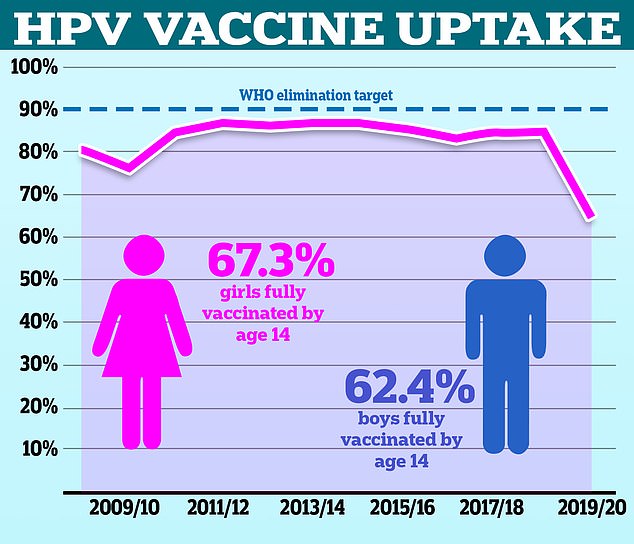[ad_1]
Health chiefs are urging the 418,000 under-25s who left school without receiving a life-saving cancer vaccine to come forward for the jab.
The HPV vaccine, routinely offered to children aged 12 to 13 in Year 8, protects against human papillomavirus—a common infection linked to several cancers.
Around 80 per cent of the population will be exposed to HPV at some point, usually through sexual contact.
Children are targeted for vaccination before they have been exposed—with the aim of providing protection through into adulthood.
In most cases the virus is harmless, but in some cases it can trigger changes in DNA that lead to cervical cancer, and cancers of the penis and anus.
When someone performs oral sex on a partner with HPV, the virus can infect cells in the mouth and throat.
The vaccine, which is proven in studies to be highly effective, prevents this from happening.
Now, GP practices across England will invite patients aged 16 to 25 to get vaccinated via letters, emails, texts and the NHS App.

Just 67.2 per cent of girls were fully vaccinated in 2021/22, down from a high of 86.7 per cent in 2013/14
Experts have previously warned that low uptake of the HPV vaccine is putting children at risk of developing cancer later in life.
They believe this may be partly due to a misconception that the jab is only relevant to sexually transmitted infections—and therefore not necessary for children.
In the 2023/24 academic year, 76.7 per cent of girls and 71.2 per cent of boys had received the vaccine by Year 10.
Uptake in Year 8—when the jab is first offered—also rose slightly on the previous year, by 1.6 percentage points in girls and 2.5 in boys.
The new push is part of the NHS’s goal to eliminate cervical cancer by 2040, by increasing vaccine coverage and boosting cervical screening rates.
It aims to raise uptake among girls to 90 per cent by the same date.
Dr Amanda Doyle, NHS England’s national director of primary care, said: ‘This vaccine is vital to our efforts to eradicate cervical cancer in girls and women – but it’s just as important for boys, too.
‘So if you’re eligible for a HPV vaccination or are the parent of a child who is eligible, but didn’t get the vaccine at school when they had the chance, I would urge you to come forward when your GP contacts you.’
Dr Sharif Ismail, a consultant epidemiologist at the UK Health Security Agency said: ‘We know that uptake of the HPV vaccination in young people has fallen significantly since the pandemic.’
This he warned has left ‘many many thousands across the country’ at greater risk of HPV-related cancers.
‘This is a real concern as each HPV vaccine, now just a single dose offered in schools, gives a young person good protection against the devastating impact of these cancers,’ Dr Ismail added.
‘We’re calling on all parents to return their children’s HPV vaccination consent forms promptly.
‘This simple action could protect your child from developing cancer in the future.’
He also urged young adults up to the age of 25, who didn’t get the jab to speak to their GP about catch-up options, because ‘it’s never too late to get protected.’
Public Health and Prevention Minister, Ashley Dalton, added: ‘If you’ve missed your vaccination at school. It isn’t too late.
‘Don’t hesitate to make an appointment with your GP. One jab could save your life.’
The vaccine can also be given to those up to age 45 with immune-compromised conditions and men who have sex with other men.
Previously children were required to get two vaccinations, but as of September 2023 they only need one new jab.
The latest HPV vaccine, first introduced in England in 2021, is proven to be more effective.
In the long term the jab is predicted to reduce cases of women’s cancer by 16 per cent and HPV attributable deaths by nine per cent more than the previous type.
Importantly, studies in England have shown that the HPV vaccine stops 90 per cent of cervical cancer cases.
[ad_2]
This article was originally published by a www.dailymail.co.uk . Read the Original article here. .

